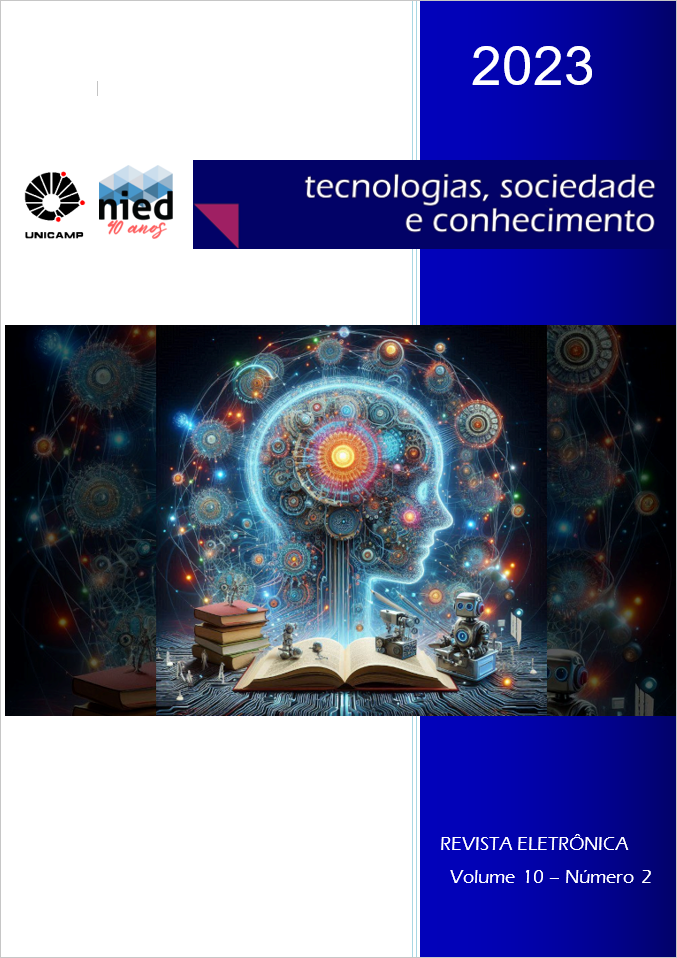Abstract
The continuous dynamism of teaching and learning, driven by the rapid technological transformation in society, calls for exploring new approaches to enhance the educational process. In this context, the use of Generative Artificial Intelligence (GAI) emerges as a promising perspective to enrich the design of lesson plans and foster more immersive and meaningful learning experiences. This study investigates the benefits, potentials, and inherent challenges of applying GAI tools, highlighting the experience of crafting an educational activity in Porto Real. This research not only creates room for critically considering the advantages of this innovative approach but also invites readers to a deeper reflection on the role of Artificial Intelligence in shaping contemporary education.
References
BERMAN, M. Tudo que é sólido desmancha no ar. A aventura da modernidade. Rio de Janeiro, RJ: Companhia das Letras, 2007.
CERVEIRA, A. J.; FASSA, A. G. Smart Trip: Experimento em Banco de Dados Dedutiva. Orientador: Marcos Vinícius Innocente Luz. Trabalho de Conclusão de Curso. Instituto de Informática, PUCRS, Porto Alegre, 1995.
DENARDIN, F. K. Influência das técnicas de Programação Neurolinguística na melhoria da comunicação homem-máquina. In: UFRGS/PROPESQ (Org), Livro de resumos. Porto Alegre, RS. Instituto de Informática – PUCRS, 1994.
KAMPFF, A. J. C. Utilização de Agentes para Suporte ao Trabalho em Grupo na Internet. Orientador: Luís Otávio Campos Alvares. 1999. 110f. Dissertação (Mestrado em Ciência da Computação) – Curso de Pós-Graduação em Ciência da Computação, Universidade Federal do Rio Grande do Sul, Porto Alegre, 1999.
KAMPFF, A. J. C. Mineração de dados educacionais para geração de alertas em ambientes virtuais de aprendizagem como apoio à prática docente. Orientador: José Valdeni de Lima. 2009. 186 f. Dissertação (Doutorado em Informática da Computação) – Centro Interdisciplinar de Novas Tecnologias na Educação, Universidade Federal do Rio Grande do Sul, Porto Alegre, 2009.
LÉVY, Pierre. As tecnologias da inteligência: o futuro do pensamento na era da informática. 2. ed. São Paulo: Editora 34, 2010.
LICHTNOW, D. et al.. O uso de técnicas de recomendação em um sistema para apoio à aprendizagem colaborativa. Revista Brasileira de Informática na Educação. Sociedade Brasileira de Computação, São Paulo, v. 14, n. 3, p. 49-59, 2006. Disponível em: http://milanesa.ime.usp.br/rbie/index.php/rbie/article/view/46/40. Acesso em: 22 dez. 2023.
MARQUES, S. D.; LAIPELT, R. do C. F. Pós-realidade e Teoria da Desinformação: inquietações sobre o uso massivo de IA Generativa. In: FÓRUM DE ESTUDOS EM INFORMAÇÃO, SOCIEDADE E CIÊNCIA, 5., 2023, Porto Alegre. Anais... Porto Alegre, Rio Grande do Sul: 2023, p. 132-140. Disponível em: https://lume.ufrgs.br/bitstream/handle/10183/265448/001177114.pdf?sequence=1&isAllowed=y. https://lume.ufrgs.br/bitstream/handle/10183/265448/001177114.pdf?sequence=1&isAllowed=yAcesso em: 14 abr. 2024.
MISHRA, P.; KOEHLER, M. J. Technological Pedagogical Content Knowledge: A framework for teacher knowledge. Teachers College Record, v. 108, n. 6, p. 1017-1054, 2006. Disponível em: https://one2oneheights.pbworks.com/f/MISHRA_PUNYA.pdf. Acesso em: 14 abr. 2024.
MOLLICK, E.; MOLLICK, L. Why all our classes suddenly became AI classes: strategies for teaching and learning in a ChatGPT world. Harvard Business Publishing Education, 9 fev. 2023. Digital Learning. 2023a. Disponível em: https://hbsp.harvard.edu/inspiring-minds/why-all-our-classes-suddenly-became-ai-classes. Acesso em: 24 mar. 2024.
MOLLICK, E.; MOLLICK, L. Let ChatGPT be your teaching assistant: strategies for thoughtfully using AI to lighten your workload. Harvard Business Publishing Education, 27 abr. 2023. Technology. 2023b. Disponível em: https://hbsp.harvard.edu/inspiring-minds/let-chatgpt-be-your-teaching-assistant. Acesso em: 24 mar. 2024.
MORAN, José. Metodologias ativas e modelos híbridos na educação. In: YAEGASHI, Solange et al. (Org.). Novas Tecnologias Digitais: Reflexões sobre mediação, aprendizagem e desenvolvimento, Curitiba, PR: CRV, 2017, p. 23-35.
PADILLA, R. D. M. La llegada de la inteligencia artificial a la educación. In: Revista de Investigación en Tecnologías de la Información, v.7, n.14, p. 260-270, 2019. DOI: https://doi.org/10.36825/RITI.07.14.022. Acesso em: 14 abr. 2024.
PORTELA, T. DA S.; KAMPFF, A. J. C. Jogos Educacionais: Interação apoiada por Agentes Animados. Revista Novas Tecnologias na Educação, Porto Alegre, v. 7, n. 3, p. 221–232, 2009. DOI: https://doi.org/10.22456/1679-1916.13647. Disponível em: https://seer.ufrgs.br/index.php/renote/article/view/13647. Acesso em: 26 dez. 2023.
RICH, E.; KNIGHT, K. Inteligência Artificial. São Paulo, SP: Makron Books, 1993.
RODRIGUES, K. S.; RODRIGUES, O. S. A inteligência artificial na educação: os desafios do ChatGPT. Texto Livre, Belo Horizonte - MG, v. 16, p. e45997, 2023. DOI: https://doi.org/10.1590/1983-3652.2023.45997. Acesso em: 14 abr. 2024.
SANT´ANA, F. P.; SANT´ANA, I. P.; SANT´ANA, C. de C. Uma utilização do Chat GPT no ensino. Com a Palavra, O Professor, v. 8, n. 20, p. 74–86, 2023. DOI: https://doi.org/10.23864/cpp.v8i20.951. Acesso em: 14 abr. 2024.
SANTAELLA, L. Balanço crítico preliminar do CHATGPT. Revista FAMECOS, Porto Alegre, v. 30, n. 1, p. 1-12, jan.-dez. 2023. DOI: https://doi.org/10.15448/1980-3729.2023.1.44380. Acesso em: 14 abr. 2024.
SANTOS, R. P.; SANT’ANA, C. DE C.; SANT’ANA, I. P. O ChatGPT como recurso de apoio no ensino da Matemática. Revemop, v. 5, p. e202303, 2023. DOI: https://doi.org/10.33532/revemop.e202303. Acesso em: 14 abr. 2024.

This work is licensed under a Creative Commons Attribution 4.0 International License.
Copyright (c) 2024 Tecnologias, Sociedade e Conhecimento


